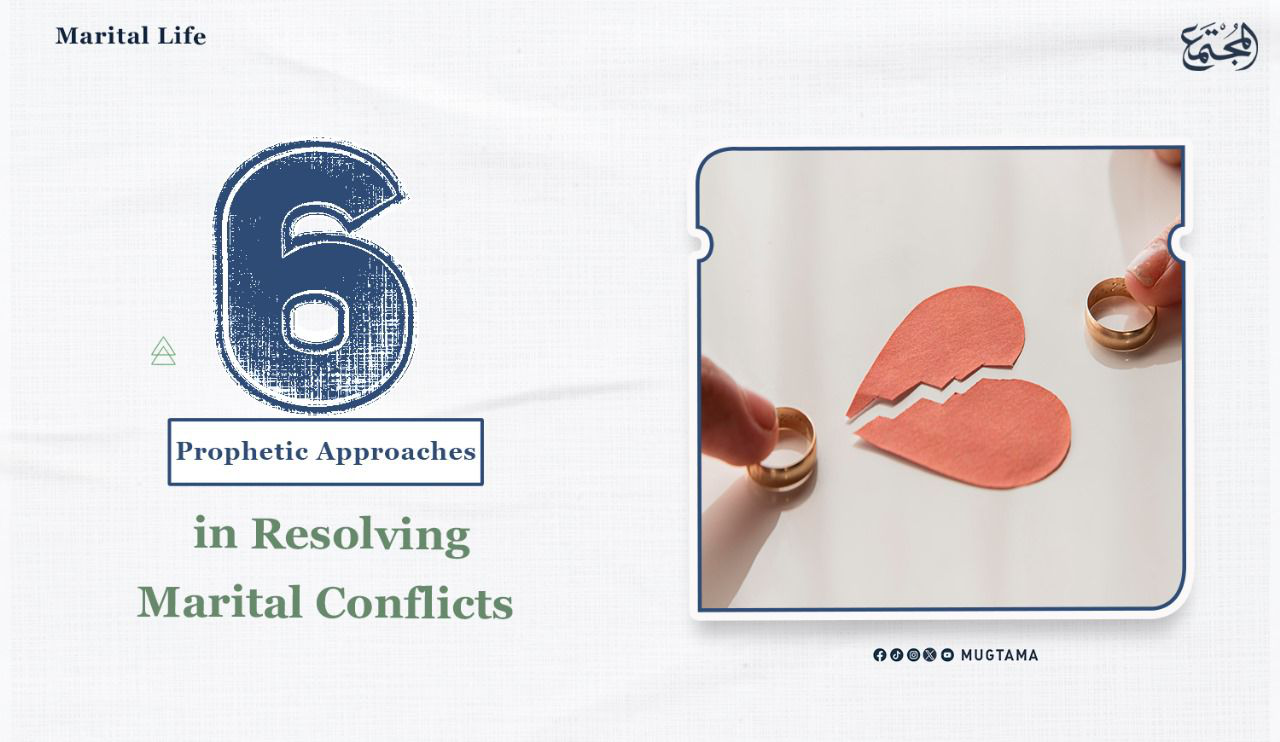6 Prophetic Approaches in Resolving Marital Conflicts

No married life is free from
hardships, disagreements, and moments of tension. Disputes may sometimes escalate when
family members or friends intervene and when each spouse clings firmly to their
opinion or position. Yet, the key to restoring peace and harmony in
Muslim homes lies in returning to the Book of Allah and the Sunnah of His
Prophet Muhammad (peace be upon him).
Allah Almighty Says, {And one of His signs is that He created for you spouses
from among yourselves so that you may find comfort in them. And He has placed
between you compassion and mercy. Surely in this are signs for people who
reflect.} [Ar-Rum 30:21]
The Prophetic Example in Resolving Marital Disputes
The noble Prophetic Sunnah
provides detailed examples of how the Messenger of Allah (peace be upon him) dealt with similar family challenges, both
within his own household and between his daughters and their husbands from
among the Companions (may Allah be pleased with them all).
The Prophet (peace be upon him)
is the best example for us and the highest model to follow. In the following hadith
lies a collection of prophetic principles and timeless wisdoms for resolving marital problems and family disputes.
Sahl Ibn Sa`d Al-Sa`idi narrated:
Allah's Messenger (peace be upon him) came to
the house of Fatimah and he did not find Ali in the house; whereupon he said: Where is your uncle's son? She said: (There cropped up
something) between me and him which had annoyed him with me. He went out and
did not rest here. Allah's Messenger (peace be upon him) asked a person to find
out where he was. He came and said: Allah's Messenger, he is sleeping in the
mosque. Allah's Messenger (peace be upon him) came to him and found him lying
in the mosque and saw that his mantle had slipped from his back and his back
was covered with dust and Allah's Messenger (peace be upon him) began to wipe
it away from him (from the body of Ali) saying: Get up, covered with dust (Abu
Turab); get up, covered with dust. (Narrated by Al-Bukhari)
Prophetic Principles in Marital Relationships
The following lines summarize six prophetic principles that every husband and wife
can build upon to prevent the escalation of disputes and to remove the seeds of conflict from within
their home.
1.
The Father’s Role
This hadith shows that the
Prophet (peace be upon him) would visit the home of his daughter Fatimah (may
Allah be pleased with her), checking on her and ensuring her well-being. This
reflects the father’s role
as a shepherd responsible for his flock, visiting his family regularly, and
upholding the bonds of kinship.
2.
Preserving Privacy
The Prophet (peace be upon him)
respected the privacy of what happened between the couple. He did not pry,
investigate, or insist on knowing every detail. Perhaps the daughter did not
wish to disclose something to her father, or the husband preferred not to
discuss the matter with his father-in-law. The Prophet (peace be upon him) only
sought further explanation if both parties themselves chose to share it.
3.
Reminding of the Bond of Kinship
The intelligence and insight of
the Prophet (peace be upon him) are evident in the way he addressed Fatimah. He
said, “Where is your uncle's son?” This
was a way of gently reminding her of the familial bond that tied her to Ali
(may Allah be pleased with him), that he was not merely her husband, but also
her close relative.
This delicate expression shows the
Prophet’s (peace be upon him) keenness in preserving love and unity between spouses.
4.
The Virtue of Discretion
This narration also underscores
the importance of safeguarding marital secrets and respecting the sanctity of private life. Fatimah (may Allah be pleased with her), even
while speaking to her father did not elaborate on the details of the dispute
between her and her husband. She neither exaggerated nor exposed her husband’s
faults.
5.
Seeking Solace in the Mosque
The hadith also demonstrates that
when Ali Ibn Abi Talib (may Allah be pleased with him) became upset, he did not
go to a lawyer, a judge, or his in-laws to complain. Instead, he went straight
to the mosque (the
house of Allah) seeking tranquility and solace.
There, in remembrance of Allah and
worship, the heart finds peace, anger evaporates, and clarity returns, and he might
hear words of wisdom that calms and guides him.
6.
Comforting Through Humor and Kindness
The Prophet (peace be upon him)
gave us an unforgettable example of tenderness and wisdom in resolving family
tension. When he found his son-in-law sleeping on the ground, covered in dust,
he neither scolded him nor demanded an explanation, nor sided with his
daughter. He did not rebuke or interrogate him.
Instead, the Prophet (peace be
upon him) smiled, gently brushed the dust from his back, and affectionately
said, “Get up, covered with dust (Abu Turab).”
Ibn Hajar commented in Fath Al-Bari
on the beauty of this prophetic approach, saying, “This incident reflects
the Prophet’s noble character, for he went out to reconcile with Ali, wiped the
dust from his back to comfort him, and playfully gave him that nickname derived
from his state at the time.”
He added, “The Prophet (peace be
upon him) did not reproach Ali for being upset with his daughter, despite how
dear she is to him. Thus, we learn the recommendation of gentleness with
in-laws and avoiding blame in order to preserve mutual affection.”
Also Read:
- 10 Tips to Win Your Husband's Heart
- Why Is Marriage Becoming More Difficult?
- 4 Unique Marital Rulings of Prophet Muhammad
-------------------------------------------------------------










